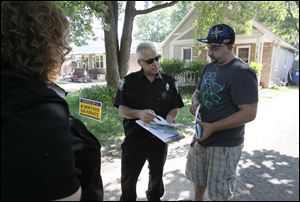
Animal agents put on plenty of miles
Humane Society and warden protect, warn
7/9/2012
Deputy Lucas County Dog Warden Walt Raftery, center, issues citations for unlicensed dogs to Jason Kelley on Thursday, June 21, on Curson Drive in Toledo. Looking on is Lucas county Dog Warden Julie Lyle. Three of the family's dogs had escaped through a hole in the fence and were roaming the neighborhood, causing a neighbor to call the Dog Warden's office. The citations will be rescinded if the family gets the dogs licensed.
While the Lucas County dog warden and the Toledo Area Humane Society have nearly opposite missions, when it comes down to it, the typical day of a deputy dog warden is not unlike that of a humane society cruelty agent.
Both spend the majority of their days driving all over the county dealing with animal-related situations.
The Lucas County dog warden, who has the duty of protecting people from dogs, has six deputy dog wardens who work Monday through Friday from 8 a.m. to 4 p.m. and one deputy who is on call evenings and weekends.
Deputy dog wardens start the day at the pound, walking seven or eight dogs. Once they hit the road, their usual first stop is Toledo Municipal Court, where they turn in any citations they wrote the day before.
The Toledo Area Humane Society, whose mission is to protect animals -- not just dogs -- from people, has two agents who work Monday through Friday from 8:30 a.m. to 5 p.m.
With a focus on enforcing animal cruelty laws in Lucas County, Officer Gene Boros and Officer Nancy Schilb investigate more than 2,000 complaints a year.
A typical day, as witnessed when The Blade was allowed to ride along with Deputy Dog Warden Walter Raftery and Officer Schilb, focused on checking for compliance with pet-ownership laws in response to complaints.
When the dog warden is fully staffed, two two-deputy vans and two solo vans are out and about. Deputies may always call for backup if situations warrant it, Dog Warden Julie Lyle said.
Mr. Raftery's sample day consisted of following up on calls initiated by the Toledo Police Department, responding to neighborhood calls that dogs were running at large or that their owners were otherwise breaking the law, such as by using leashes so long that their dogs impede pedestrians on the sidewalk.
The humane society investigates cases of animal cruelty, which are divided into two categories: Neglect and intentional cruelty. Neglect is the failure to provide an animal with the necessities of care, such as access to food and fresh water, shelter from the weather, a clean living environment, or veterinary care.
Intentional cruelty involves deliberate physical harm or injury to an animal, such as neighborhood children torturing cats, owners beating an animal that has "misbehaved," or blood sports such as dog and cock fighting.
Ms. Schilb, who covers the county's western half and typically logs 50 to 70 miles a day on the road, started her day with a municipal court case of a Toledo woman charged with second-degree cruelty for failing to provide water and shelter for her dog. The owner already had signed over ownership of the dog to the humane society.
"That way he can go up for adoption and doesn't have to sit in a cage pending the outcome of the case," Ms. Schilb said. "When the cases take a while, it's really hard on the dog -- they can go cage crazy."
Other calls included checking on the condition of a horse that was reportedly without food and water. The owners were not on the premises, and Ms. Schilb could not enter the barn, so she left the owners a notice to call her.
Both Mr. Raftery and Ms. Schilb left several notices and will have to follow up on their initial visits.
Both humane agents and deputy dog wardens spend a good deal of time trying to educate about responsible pet ownership. Neither deputies or humane agents are armed, although they sometimes enter precarious situations, either with vicious dogs or hostile owners.
One of Mr. Raftery's calls was a follow-up on a situation previously investigated by Toledo police. It involved two neighboring dogs who were fighting. Although no citations were issued at the time because the dogs were properly licensed and confined, a homeowner was ordered to repair a gap in a fence through which the dogs had been attacking each other.
"Sometimes all it takes is a visit to get people to see they need to take care of the problem and not let it happen again," said Mr. Raftery, a deputy dog warden for 20 years.
Another call stemmed from a complaint that a dog was able to reach the sidewalk although it was chained to its owner's porch. The dog turned out to be unlicensed, but the citation Mr. Raftery gave the owner, Chad Cole, carried a fine that would be waived if, within three days, Mr. Cole provided proof he had obtained a license.
Ms. Lyle, who was accompanying Mr. Raftery, asked Mr. Cole if he would be interested in getting his "pit bull"-type dog spayed at a discount. When he expressed interest, she retrieved from the dog-warden van a flyer for "Fix A Bull," a low-cost spay/neuter/microchip program for "pit bulls" her office is conducting with Humane Ohio, thanks to a grant from PetSmart charities.
"She's a really good dog," Mr. Cole said of the dog, named Essence. "We've been wanting to get this done, I'm glad to hear about it."
Contact Tanya Irwin at: tirwin@theblade.com or 419-724-6066.